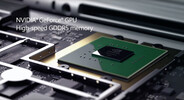Intel UHD Graphics P630 vs NVIDIA Maxwell GPU Surface Book vs Intel HD Graphics P630
Intel UHD Graphics P630
► remove from comparison
Die Intel UHD Graphics P630 (GT2) ist eine integrierte Grafikeinheit, die in verschiedenen Desktop- und Notebook-Prozessoren der 2017 vorgestellten Coffee-Lake-Generation (Xeon) zu finden ist. Die mittlere, auch "GT2" genannte Ausbaustufe verfügt über 24 EUs (Execution Units bzw. Ausführungseinheiten). Technisch unterscheidet sie sich von der UHD Graphics 630 in Consumer Prozessoren (siehe für Benchmarks).
Performance
Die exakte Leistung der UHD Graphics 630 hängt vom jeweiligen CPU-Modell ab, da sich TDP, Maximaltaktrate und Größe des L3-Caches teils stark unterscheiden können. Zum anderen bestimmt auch der verwendete Speicher (DDR3/DDR4) die Performance. Im Durchschnitt sollte die Leistung jedoch nur minimal oberhalb der Intel HD Graphics 530 liegen, wodurch sich anspruchsvolle Spiele aus 2016 wie Watch Dogs 2, Dishonored 2 oder Mafia 3 nicht spielbar sind. Weniger anspruchsvolle Spiele wie Overwatch oder Farming Simulator 17 sind jedoch in niedrigen Details flüssig spielbar.
Features
Die Features entsprechen der Intel HD Graphics 630. Somit unterstützt die integrierte Videoengine H.265 in 4K und 10 Bit in Hardware und dank HDCP 2.2 sollten auch Netflix-Videos unter Windows 10 in 4K ausgegeben werden können. HDMI 2.0 unterstützt die UHD Graphics 630 jedoch wahrscheinlich weiterhin nur per Wandler (LSPCon) über den DisplayPort.
Leistungsaufnahme
Die UHD Graphics P630 ist in Desktop- und Notebook-Prozessoren verschiedener TDP-Klassen zu finden. Die Quad-Core CPUs sind jedoch meistens in größeren und schwereren Notebooks verbaut. Der verbesserte 14nm++ Prozess verspricht jedoch eine etwas geringere Leistungsaufnahme im Vergleich zur Intel HD Graphics P530.
NVIDIA Maxwell GPU Surface Book
► remove from comparison
Die Nvidia Maxwell GPU im Surface Book ist eine Nvidia GeForce 940M mit 1 GB GDDR5 Grafikspeicher. Neben leicht abweichenden Taktraten ist der eingesetzte schnellere Grafikspeicher (GDDR5 vs DDR3) der Hauptunterschied. Wie die 940M basiert die Grafikkarte auf dem GM108 Chip mit 384 Shadereinheiten und einem 64-Bit Speicherinterface (hier jedoch wie angemerkt mit GDDR5).
Die Leistung ist durch den schnelleren GDDR5 Grafikspeicher zwischen 10 und 30 Prozent oberhalb der üblichen GeForce 940M anzusiedeln, bleibt jedoch noch klar hinter einer Nvidia Geforce 945M und GTX 950M. Bei anspruchsvollen Spielen reicht es daher meist nur für niedrige Detail-Settings.
Mehr Details gibt es in unserem umfangreichen Test des Microsoft Surface Book mit dedizierter Grafikkarte (dGPU).
Intel HD Graphics P630
► remove from comparison
Die Intel HD Graphics P630 (GT2) ist eine integrierte Workstation-Grafikeinheit, die in verschiedenen Desktop- und Notebook-Prozessoren der 2017 vorgestellten Kaby-Lake-Generation zu finden ist (Xeon E3-1200 v6 und e3-1500M v6 Serien). Sie ist identisch mit der Intel HD Graphics 630, jedoch sind die Treiber für professionelle Software optimiert. Daher unterscheidet sie sich auch nicht von der Intel HD Graphics P530 und erreicht laut Intel auch die selbe Leistung im SPEC Viewperf12 (1.94x der alten Intel HD Graphics P4000). Die Grafikkarte ist derzeit für 15 CAD- und Workstation-Anwendungen zertifiziert.
Features
Neu bei der Kaby-Lake Generation ist die verbesserte Videoengine, welche nun auch H.265/HEVC im Main10-profil mit 10 Bit Farbtiefe sowie Googles VP9-Codec in Hardware dekodieren kann. Die Chips mit HD Graphics 530 sollten auch bereits HDCP 2.2 unterstützen und somit z.B. Netflix-Videos unter Windows 10 in 4K ausgeben können (im Gegensatz zu den ersten Kaby-Lake Dual-Core Chips mit Intel HD Graphics 620).
Leistungsaufnahme
Die HD Graphics P630 ist in Desktop- und Notebook-Prozessoren verschiedener TDP-Klassen zu finden. Die Quad-Core CPUs sind jedoch meistens in größeren und schwereren Notebooks verbaut. Der verbesserte 14nm+ Prozess verspricht jedoch eine etwas geringere Leistungsaufnahme im Vergleich zur Intel HD Graphics P530.
Quelle: http://www.intel.com/content/dam/www/public/us/en/documents/guides/hd-graphics-performance-guide.pdf
| Intel UHD Graphics P630 | NVIDIA Maxwell GPU Surface Book | Intel HD Graphics P630 | ||||||||||||||||||||||||||||||||||||||||||||||||||||||||||||||||||||||||||||||||||||||||||||||||||||||||||
| Gen. 9.5 Serie |
|
|
| |||||||||||||||||||||||||||||||||||||||||||||||||||||||||||||||||||||||||||||||||||||||||||||||||||||||||
| Codename | Coffee-Lake-GT2 | Surface Book | Kaby-Lake-H-GT2 | |||||||||||||||||||||||||||||||||||||||||||||||||||||||||||||||||||||||||||||||||||||||||||||||||||||||||
| Architektur | Gen. 9.5 | Maxwell | Gen. 9.5 Kaby Lake | |||||||||||||||||||||||||||||||||||||||||||||||||||||||||||||||||||||||||||||||||||||||||||||||||||||||||
| Pipelines | 24 - unified | 384 - unified | 24 - unified | |||||||||||||||||||||||||||||||||||||||||||||||||||||||||||||||||||||||||||||||||||||||||||||||||||||||||
| Kerntakt | 300 - 1200 (Boost) MHz | 954 - 993 (Boost) MHz | ||||||||||||||||||||||||||||||||||||||||||||||||||||||||||||||||||||||||||||||||||||||||||||||||||||||||||
| Speicherbandbreite | 64/128 Bit | 64 Bit | 64/128 Bit | |||||||||||||||||||||||||||||||||||||||||||||||||||||||||||||||||||||||||||||||||||||||||||||||||||||||||
| Shared Memory | ja | nein | ja | |||||||||||||||||||||||||||||||||||||||||||||||||||||||||||||||||||||||||||||||||||||||||||||||||||||||||
| API | DirectX 12_1, OpenGL 4.4 | DirectX 12 (FL 11_0), Shader 5.0, OpenGL 4.5 | DirectX 12_1, OpenGL 4.4 | |||||||||||||||||||||||||||||||||||||||||||||||||||||||||||||||||||||||||||||||||||||||||||||||||||||||||
| Herstellungsprozess | 14 nm | 28 nm | 14 nm | |||||||||||||||||||||||||||||||||||||||||||||||||||||||||||||||||||||||||||||||||||||||||||||||||||||||||
| Features | QuickSync | GPU Boost 2.0, Optimus, PhysX, CUDA, GeForce Experience | QuickSync | |||||||||||||||||||||||||||||||||||||||||||||||||||||||||||||||||||||||||||||||||||||||||||||||||||||||||
| Erscheinungsdatum | 01.10.2017 | 01.10.2015 | 05.08.2015 | |||||||||||||||||||||||||||||||||||||||||||||||||||||||||||||||||||||||||||||||||||||||||||||||||||||||||
| Speichertakt | 5012 MHz | |||||||||||||||||||||||||||||||||||||||||||||||||||||||||||||||||||||||||||||||||||||||||||||||||||||||||||
| Speichertyp | GDDR5 | |||||||||||||||||||||||||||||||||||||||||||||||||||||||||||||||||||||||||||||||||||||||||||||||||||||||||||
| Max. Speichergröße | 1024 MB |
|
| |||||||||||||||||||||||||||||||||||||||||
Benchmarks
Cinebench R15 OpenGL 64 Bit + NVIDIA Maxwell GPU Surface Book
Average Benchmarks NVIDIA Maxwell GPU Surface Book → 0% n=0
Average Benchmarks Intel HD Graphics P630 → 0% n=0
* Smaller numbers mean a higher performance
1 This benchmark is not used for the average calculation
Spiele-Benchmarks
Die folgenden Benchmarks basieren auf unseren Spieletests mit Testnotebooks. Die Performance dieser Grafikkarte bei den gelisteten Spielen ist abhängig von der verwendeten CPU, Speicherausstattung, Treiber und auch Betriebssystem. Dadurch müssen die untenstehenden Werte nicht repräsentativ sein. Detaillierte Informationen über das verwendete System sehen Sie nach einem Klick auf den fps-Wert.

Metal Gear Solid V
2015
F1 2014
2014
Thief
2014
Metro: Last Light
2013
BioShock Infinite
2013
Tomb Raider
2013
Sleeping Dogs
2012| NVIDIA Maxwell GPU Surface Book | low | med. | high | ultra | QHD | 4K |
|---|---|---|---|---|---|---|
| Metal Gear Solid V | 42 | 35.9 | 19.7 | 13.3 | ||
| Batman: Arkham Knight | 23 | 14 | ||||
| F1 2014 | 117 | 94 | 76 | 49 | ||
| Thief | 45.6 | 28.2 | 22.3 | 9.4 | ||
| Metro: Last Light | 59.6 | 44.7 | 30.7 | 15.7 | ||
| BioShock Infinite | 94.2 | 64.8 | 56.5 | 20.8 | ||
| StarCraft II: Heart of the Swarm | 258 | 141.2 | 74.2 | 37.5 | ||
| Tomb Raider | 161.5 | 82.8 | 55.2 | 25.8 | ||
| Sleeping Dogs | 112.4 | 85.6 | 42.8 | 10.9 | ||
| < 30 fps < 60 fps < 120 fps ≥ 120 fps | 1 3 3 2 | 2 2 4 1 | 2 4 2 | 6 2 | | |
Eine Liste mit weiteren Spielen und allen Grafikkarten finden Sie auf unserer Seite: Welches Spiel ist mit welcher Grafikkarte spielbar?













